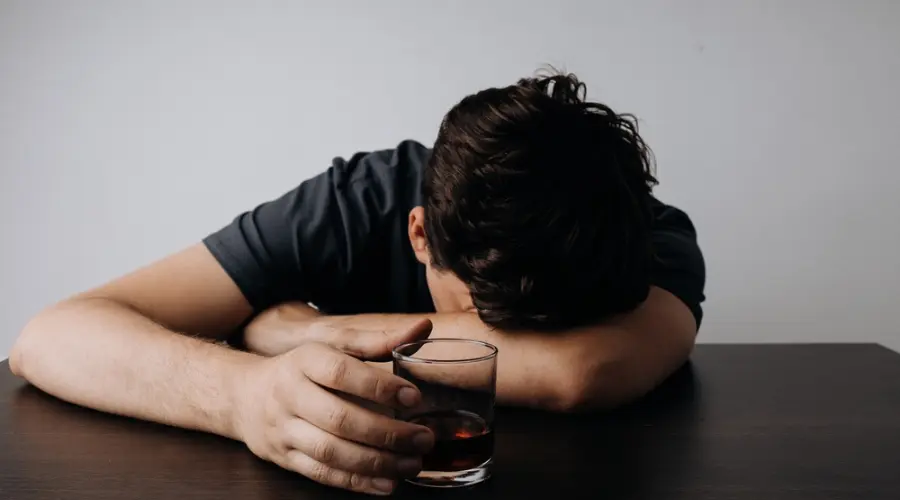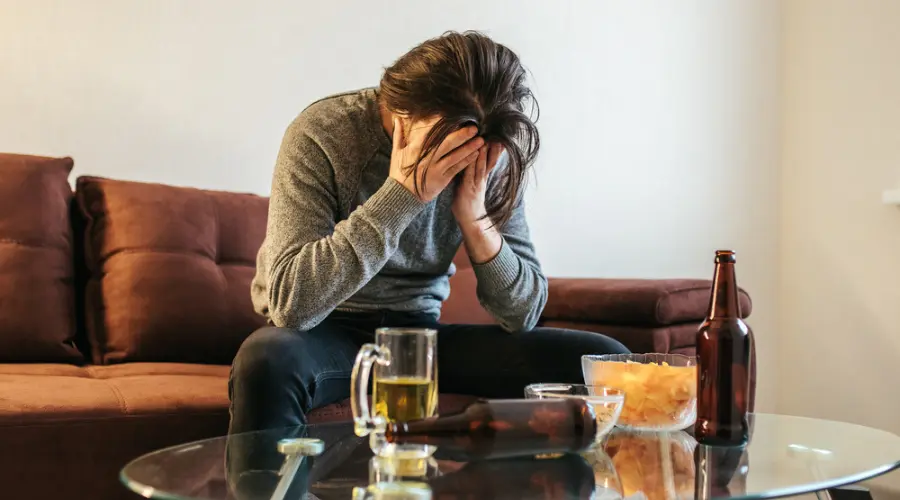Looking at the Connection Between Drinking and Trauma Disorders
There’s a strong association between trauma and problematic drinking behaviors. For many people, the connection between drinking and trauma is a complex relationship.
Drinking alcohol can bring some symptom relief while you are intoxicated–but it can make common symptoms of PTSD worse, too, while causing other problems in your life.
Some of these problems can be incredibly serious and traumatic in and of themselves. For example, car accidents or job loss occurring as a result of alcohol use.
So, can alcohol trigger trauma? How do you get to a place where you can manage your symptoms and live the life you want to?
First, let’s talk about the link between PTSD or trauma and alcohol misuse. Then, we’ll discuss treatment for PTSD and alcohol use, as well as how to support a loved one struggling with both PTSD and addiction.
Can Alcohol Trigger Trauma?
Sometimes, people drink to cope with unresolved challenges like trauma. While drinking can provide temporary relief and might feel like an “escape” for those with a traumatic past, alcohol use can trigger worsened symptoms of conditions like post-traumatic stress disorder (PTSD).
For example, sleep problems are commonly associated with PTSD, but alcohol can disrupt your sleep. The same is true for other symptoms, like anger, irritability, depression, mood swings, emotional numbness, avoidance symptoms, and feeling jittery or on edge.
Legal, financial, social, and occupational (work-related) issues caused by alcohol can also impact your life and make it harder to heal from trauma.
The Cyclic Nature of Alcohol and Trauma
If you drink to ease distressing symptoms seen in co-occurring PTSD, you may unintentionally create a vicious cycle where you drink to cope with traumatic memories but face worsened mental health in turn. Alcohol treatment can help you break that cycle.
Commonly, people start to drink more alcohol than before as they develop a tolerance. This is another part of how an unaddressed traumatic experience could ultimately lead to an alcohol use disorder.
Alcohol Addiction and Post-Traumatic Stress Disorder
Alcohol use disorder, which is the formal diagnostic term for alcohol addiction, is more common in people with PTSD. Statistics suggest, for example, that 60-80% of Vietnam Veterans seeking PTSD treatment have problems with alcohol and that military veterans are more likely to engage in binge drinking behaviors.
Having gone through any traumatic event(s) is a risk factor for substance abuse and various other mental health concerns. In addition to alcohol abuse, people with past traumatic experiences have a greater likelihood of:
- Some physical health conditions (e.g., chronic pain)
- Other types of drug use
- Self-destructive behavior
- Eating disorders
- Anxiety disorders
- Mood disorders
- Personality disorders
Anyone who has been through a traumatic event can develop PTSD.
Ongoing or repeated traumatic events–like persistent sexual abuse or emotional abuse–are linked to complex PTSD, which is associated with additional and more severe PTSD symptoms.
Treatment Options for Co-Occurring Alcohol Abuse and PTSD Symptoms
Treating PTSD symptoms and alcohol use (or alcohol dependence) at the same time is recommended for anyone experiencing both.
Since they can worsen one another, and since substance abuse can act as a coping mechanism for people who have survived trauma, choosing a treatment center able to address PTSD and alcohol use comprehensively is ideal.
What are your treatment plans for PTSD and alcohol, though? Detox, inpatient rehab programs, outpatient rehab programs, and outpatient therapy services can all be helpful.
Therapies known to treat PTSD include but aren’t limited to the following.
- Cognitive processing therapy
- Trauma-focused cognitive behavioral therapy
- Eye movement desensitization and reprocessing
- Prolonged exposure therapy
Behavioral therapy, motivational enhancement therapy, family therapy, and other treatments, including some medications, are used for addiction.
Dual-Diagnosis Treatment at South Shores
At South Shores Detox, we understand the importance of addressing co-occurring disorders. Treatment that addresses any mental health concerns alongside addiction is linked to better treatment outcomes.
Our dual-diagnosis detox and treatment center in California combines trauma-focused therapy methods with addiction therapies, medications, and other treatments to address PTSD and alcohol abuse.
Inpatient and Outpatient Alcohol Treatment Programs
We have inpatient and outpatient treatment programs. This means that trauma survivors facing PTSD and alcohol abuse who are interested in treatment at our center can get the level of care they need, whether it means living at home and coming in for treatment a few days per week or admitting to our inpatient program, where you’ll live on-site and have 24/7 support from staff.
Some clients start with inpatient rehab and step down to an outpatient program to ease the transition back into daily life. We’ll help you or your loved one choose the right treatment trajectory with confidence.
Detox as a First Step to Addiction Recovery
When you first stop drinking, severe and potentially life-threatening mental and physical symptoms of withdrawal can occur. For example, extreme alcohol cravings, shaking, sweating, and seizures. It is highly recommended that anyone engaging in high levels of alcohol use attend detox prior to entering one of our therapy programs for this reason.
Detox will help you get through the acute withdrawal stage. Once acute withdrawal is over, you can transition into one of our inpatient or outpatient programs, where PTSD and alcohol use can be treated thoroughly.
Helping a Loved One Facing Alcohol Use Disorder and Trauma
Having a good support system can be incredibly helpful for those with a substance use disorder or any other mental health condition. If you have a loved one facing alcohol use disorder and PTSD symptoms, here are a few ways to support them.
- Attend therapy sessions with your loved one at South Shores. Our programs offer family therapy and couples therapy.
- Learn about addiction. We offer psychoeducation for family members and loved ones, which can help you understand what the person in your life facing addiction is going through. We’ll also discuss how to navigate situations that may arise or impact your family or household.
- Plan an intervention. People facing alcohol use disorder who have not yet pursued treatment on their own often benefit from an intervention. We can help you with staging one if needed.
You’re welcome to call South Shores for yourself or someone else. Developing PTSD, addiction, or both, is something that can happen to anyone, and healing is more than possible.
Call South Shores Detox for Trauma and Alcohol Treatment
South Shores Detox is a duly accredited substance abuse treatment center in Orange County, CA. We help people seeking treatment for substance use disorders and co-occurring mental health conditions like PTSD find relief.
It’s time to begin your recovery journey. To learn more, please call our admissions line today.
FAQs Regarding Alcohol and Trauma
What are the symptoms of alcohol brain damage?
Memory problems, confusion, lack of muscle coordination (which may lead to trouble with balance or posture), and vision changes are some possible signs of alcohol brain damage.
Seeking prompt treatment for symptoms like muscle and vision problems is vital. Thiamine treatment for Wernicke’s disease, for example, can help you avoid Korsakoff’s psychosis.
What happens when you drink alcohol every day?
In addition to physical dependence, daily alcohol consumption can lead to:
- Sleep disturbances (e.g., trouble falling asleep, early waking)
- A higher risk of some types of cancer
- Brain damage, which can be permanent
- Liver damage or disease
- Heart (cardiovascular) problems
- New or worsened mental health
- Digestive issues, including inflammation and bleeding
- Sexual and fertility-related problems
- Weakened immune system
Getting and staying sober can reduce your risk of permanent brain damage and other serious consequences that may occur when you abuse alcohol.
Why do people with childhood trauma drink?
Childhood abuse, sexual assault, natural disasters, and other events can cause severe emotional distress and other PTSD symptoms. Drinking can be a form of self-medication for trauma survivors.
Those who went through traumatic events as children may start to drink and, in some cases, develop alcohol use disorders. Developing healthier coping mechanisms for trauma triggers in treatment can help.
Why do some people use alcohol as a coping mechanism?
Since it is legal for adults aged 21+ in the US, it makes sense that alcohol is one of the most widely abused substances.
Very temporarily, alcohol may stifle symptoms like intense fear, anxiety, intrusive thoughts, or trouble experiencing positive emotions. However, what starts as a way to self-medicate can cause extreme mental, social, and physical harm in time.
References
- https://pmc.ncbi.nlm.nih.gov/articles/PMC5821259/
- https://www.ptsd.va.gov/understand/related/problem_alcohol_use.asp
- https://www.apa.org/ptsd-guideline/treatments
- https://nida.nih.gov/publications/drugs-brains-behavior-science-addiction/treatment-recovery
- https://www.niaaa.nih.gov/publications/brochures-and-fact-sheets/wernicke-korsakoff-syndrome
- https://www.niaaa.nih.gov/publications/alcohol-and-brain-overview





